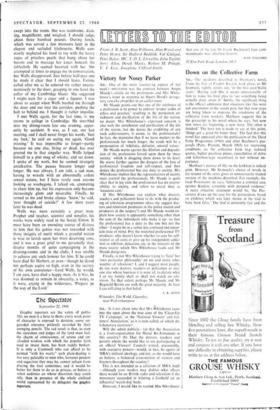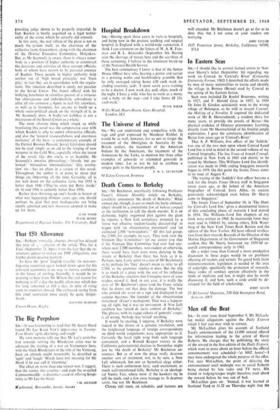Down on the Collective Farm
SIR, —The incidents described in o/haev's novel, From the Life of Fvodor tiazkin. took place, as Mr Szamuely rightly points out, 'in the first post-Stalin years.' Having said this it seems unreasonable of him to make his final plea to 'see something being actually done about it.' Surely, the significant thing is the official admission that situations like this were not uncommon in the recent past, but that now steps are being taken to improve the conditions of the collective farm workers. Mozhaev suggests this in the postscript to his novel where he says, 'but now new times are beginning, a new story. The other is finished.' The hero too is made to say at this point, 'things got a good bit better then.' The fact that this novel has appeared after the publication of the Third Party Programme (1961) and after Brezhnev's pro- posals (Party Plenum, March 1965) for improving conditions on the collective farm (e.g. reduced quotas, higher purchase prices, cancellation of debts and Liberman-type incentives) is not without im- portance.
Mozhaev's picture of life on the kolkhoz is indeed grim. However, Mr Szamuely's choice of words in his résumé of the story gives an unnecessarily slanted version of the incidents described. For example, the local Procurator, he says, 'fabricates a criminal case against Kuzkin, complete with perjured evidence.' A more objective statement would be, the Pro- curator draws up the case for the prosecution, based on evidence which was later shown at the trial to have been false.' The trial is eminently fair and the
presiding judge shown to be properly impartial. In fact, Kuzkin is finally acquitted on a legal techni- cality of the crime which he actually did commit.
In this story, the real villain of the piece is not so much the system itself, as the chairman of the collective farm, Guzyonkov, along with the chairman of the District Executive Committee, Motyakov. But, as Mr Szamuely is aware, there is always some- body in a position of higher authority to counteract the decisions and activities of these corrupt officials, both of whom have reason to be personal enemies of Kuzkin. These people in higher authority help neither out of 'high moral principle,' nor 'from pity;' in fact they act in accordance with the regula- tions. The situation described is surely not peculiar to the Soviet Union. The brutal official with his bullying henchmen in relentless pursuit of a virtuous but obstreperous and individualistic subordinate is after all too common a figure in real life anywhere, as well as in literature, for any one to build up a whole socio-political attack on the strength of it, as Mr Szamuely does. A badly-run kolkhoz is not a microcosm of the Soviet Union as a whole.
The most obvious thing which struck us while translating this novel was the comparative ease with which Kuzkin is able to outwit obstructive officials, and also the 'natural resourcefulness and enormous resilience' of the hero—a contemporary example of the Eternal Russian Peasant. Soviet Literature should not be read simply as an aid to the forging of new weapons in the Cold War, especially when the intent of the novel, like this one's, is so laudable. Mr Szamuely's emotive phraseology—'bloody but un- bowed,' miraculous intermediation,' dire retribu- tion' etc.—has no place in a review of this novel. Throughout, the author is at pains to stress that things are improving all the time. Certainly, all is not well down on the collective farm, but 1953 is better than 1946 ('They've even put Beria inside,' ch. 6) and 1966 is certainly better than 1956.
Rather than throwing up one's hands in horror at what was happening thirteen years ago, one should perhaps be glad that past inadequacies are being openly admitted and new measures adopted to make up for them.
ALAN WOOD PETER HENRY
Department of Russian Studies. The University, Hull



































 Previous page
Previous page